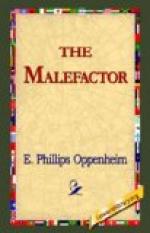“Lucky! Do you think I don’t realize it? Of course, I know the old governor had lots of friends on the Street, but he was never in a big way, and he got hit awfully hard himself before he died. I can’t understand it anyway.”
“I wouldn’t try,” Aynesworth remarked, laughing. “By the bye, your friend, whoever he was, must have got to know pretty quickly.”
Nesbitt nodded.
“I thought of that,” he said. “Of course, Phillsons are lawyers for Malcolmson, Wingrave’s broker, so I daresay it came from him. Say, Aynesworth, you don’t mind if I ask you something?”
“Not at all,” Aynesworth answered. “What is it?”
“Why the devil do you stop with a man like Wingrave? He doesn’t seem your sort at all.”
Aynesworth hesitated.
“Wingrave interests me,” he answered. “He has had a curious life, and he is a man with very strange ideas.”
Nesbitt finished his drink, and rose up.
“Well,” he said, “he’s not a man I should care to be associated with. Not but what I daresay he was right upstairs. He’s strong, too, and he must have a nerve. But he’s a brute for all that!”
Nesbitt went his way, and Aynesworth returned upstairs. Wingrave was alone.
“Have we finished this miserable business?” Aynesworth asked.
“For the present,” Wingrave answered. “Mr. Malcolmson will supply you with a copy of the accounts. See that Hardwell is credited with a quarter share of the profits. Our dealings are over for the present. Be prepared to start on Saturday for the West. We are going to look for those bears.”
“But the mine?” Aynesworth exclaimed. “It belongs to you now. Aren’t you going out to examine it?”
Wingrave shook his head.
“No,” he said, “I know nothing about mines. My visit could not teach me anything one way or the other. I have sent a commission of experts. I am tired of cities and money-making. I want a change.”
Aynesworth looked at him suddenly. The weariness was there indeed—was it his fancy, or was it something more than weariness which shone out of the dark, tired eyes?
Book II
“Mr. Wingrave from America”
“Four years ago tonight,” Aynesworth said, looking round the club smoking room thoughtfully, “we bade you farewell in this same room!”
Lovell, wan and hollow-eyed, his arm in a sling, his once burly frame gaunt and attenuated with disease, nodded.
“And I told you the story,” he remarked, “of—the man who had been my friend.”
“Don’t let us talk of Wingrave tonight!” Aynesworth exclaimed with sudden emphasis.
“Why not?” Lovell knocked the ashes from his pipe, and commenced leisurely to refill it. “Why not, indeed? I mean to go and see him as soon as I can get about a little better.”
“If your description of him,” Aynesworth said, “was a faithful one, you will find him changed.”




